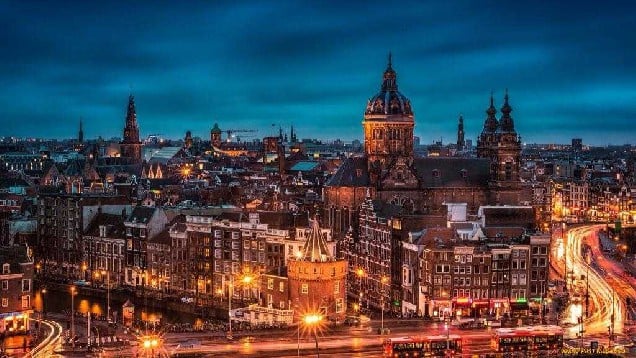
Red Light District in Amsterdam: The Essential Insider’s Guide in 2024
Red Light District Amsterdam: The Ultimate Guide
Explore the Red Light District in Amsterdam with us! Our easy-to-read guide covers everything from its history to today’s scene. Perfect for all curious about this famous spot. Keep reading to find out more!
MOULIN ROUGE TICKETS
History & Evolution of the Red Light District

The Red Light District, known locally as De Wallen, is not just a major tourist attraction in Amsterdam; it’s a significant part of the city’s historical fabric. This area has been associated with the sex trade since the 14th century, originally due to its proximity to the city’s harbor. Over centuries, it evolved from a seedy area with a reputation for vice into a regulated and much-visited part of Amsterdam. In recent years, the district has seen transformations aimed at curbing the negative aspects associated with it, such as human trafficking and crime. These efforts include city-led initiatives to reduce the number of red-light windows and replace them with art galleries, boutiques, and other businesses.
We find the history of De Wallen very interesting. It goes back to the origins of the Dutch capital. In our opinion, Amsterdam Red Light District shows the liberal thinking of the Dutch.

The Red Light District stands as a testament to Amsterdam’s liberal attitudes but also reflects the city’s ongoing struggle to balance tourism, local life, and the well-being of sex workers. Visitors today will find a blend of historical buildings, museums (like the famous Red Light Secrets – Museum of Prostitution), bars, sex shows and the characteristic red-lit windows. The area’s evolution is ongoing, and understanding its history provides crucial context for appreciating its complex present-day status.
Legal & Social Aspects

The Red Light District operates within a unique legal framework that sets Amsterdam apart from most other cities. Prostitution has been legal and regulated in the Netherlands since 2000, with sex workers required to register with the local chamber of commerce and pay taxes. This legal recognition is aimed at ensuring better conditions and protection for sex workers. Similarly, the sale and consumption of cannabis in designated coffee shops are decriminalized, contributing to the district’s liberal ambiance. These laws continue to provoke debate, with some arguing that they help reduce crime and improve safety, while others claim they encourage illegal activities.
Socially, the district has a dual character. On the one hand, it’s a symbol of the city’s tolerance and progressive values. On the other, it raises questions about morality, exploitation, and the commodification of bodies. The district’s existence and Amsterdam’s approach to these issues are often used as case studies in discussions about the best way to manage and regulate the sex trade. For visitors, it’s essential to approach the area with an understanding of these legal and social complexities, recognizing that behind the district’s allure lies a nuanced and often contentious reality.
Cultural Significance & Misconceptions

The Red Light District is not only a hub of adult entertainment; it’s also a cultural landmark with deep significance for Amsterdam. It embodies the city’s historical tolerance and liberal attitudes towards issues considered taboo elsewhere. This district, however, is often misunderstood by outsiders. Many view it merely as a tourist destination without appreciating its cultural and historical significance. The area is not just about sex and drugs; it’s a living, breathing part of the city with a rich history and a diverse community.
Misconceptions about the district often stem from sensationalized media portrayals that focus on crime and debauchery, overshadowing the area’s cultural richness and the everyday lives of those who work and live there. In reality, the Red Light District is a complex area where art, history, commerce, and issues of social justice intersect. Efforts have been made to reshape its image, emphasizing its cultural aspects, such as its architecture, historic canals, and unique businesses that coexist alongside the sex industry. Visitors are encouraged to look beyond the surface to understand the district’s true nature and significance in Amsterdam’s cultural landscape.
The uncensored Red Light District in Amsterdam is an area that raises many questions due to it uniqueness. Stop looking for the right information. That is no longer necessary. You’ve just found it! Discover the most important facts about the Red Light District in Amsterdam now.
GET AMSTERDAM APP >Facts
Discover these facts below before visiting!

1 | Red Light District Amsterdam is known as De Wallen
This neighbourhood is known worldwide as the Red Light District, but in the Netherlands it is called De Wallen.

A city archaeologist describes (during this Amsterdam Red Light District tour) what De Wallen means:
The word ‘Wallen’ comes from the canals that cross section the Red Light District; the Oudezijds Voorburgwal and the Oudezijds Achterburgwal. A ‘burgwal’ means ‘defensive wall’ with a canal in front, but now the name is used for the canals itself, which were dug as a defense for Amsterdam.
2 | Red Light District Amsterdam has 201 window brothels
With 201 window brothels, De Wallen is the largest prostitution area in the Netherlands. The window brothels are rented out by window brothel operators during the day and at night.

De Wallen can accommodate up to 402 sex workers per day. However, it never happens that all Red Light windows are rented out during the day as well as at night.
Over time, the number of Amsterdam Red Light windows decreased significantly. In 2011 this neighborhood still had 297 window brothels. And in 2006 this number was even 401.
3 | It counts 350 sex workers
It’s estimated that there are about 350 prostitutes working in the Red Light District in Amsterdam.

The majority of the prostitutes prefer to work night shifts.
4 | It can be visited 24/7
The Red Light District in Amsterdam is always open to visit. This is partly because it is an inhabited neighborhood. That is why De Wallen can be visited 7 days a day, 24 hours a day.

However, it is not the case that everything in the area is accessible 24/7. The window brothels are closed between 6am and 8am. Most restaurants close at midnight. And bars are open until 3 PM on weekends.
5 | Prostitutes Can Not Accept Creditcards
Although many sex workers would, they cannot accept credit card payments. This is because payment companies do not want to be associated with sex work.

As a result, payment companies and banks do not accept sex workers as customers. Therefor, sex workers’ clients cannot pay by credit card.
6 | It Cost At Least 50 Euro To Have Sex With A Window Prostitute
Window prostitutes in Amsterdam charge at least 50 euro for sex for 15 minutes.

Customers and prostitutes usually negotiate prices and services at the entrance of the window brothel.
7 | It Has 4,465 Inhabitants
The Red Light District is currently inhabited by 4,465 residents. In 2019, De Wallen had 4,295 inhabitants.

The age distribution of the residents in the Red Light District looks like this:
✦ 0 – 15 years: 200 inhabitants
✦ 15 – 25 years: 695 inhabitants
✦ 25 – 45 years: 2,195 inhabitants
✦ 45 – 65 years: 940 inhabitants
✦ > 65 years: 425 inhabitants
The above figures come from this population survey.
8 | 1,757 Crimes Are Committed Annually
In 2020, 1,756 crimes were recorded by the police in the Red Light District in Amsterdam.

The top five most committed crimes in this neighborhood:
- Property crimes
- Pickpocketing
- Violation of public order
- Theft of bicycles or mopeds
- Shoplifting
Local crime investigation in Amsterdam has shown the above figures.
9 | Cannabis Shops Do Not Allow The Use Of Tobacco
It is not allowed to smoke tobacco in cannabis shops which are also known as coffeeshops.

In the Netherlands it is prohibited by law to smoke tobacco inside public buildings such as restaurants, cafes, museums, etc. This also applies to cannabis shops. It is only allowed to smoke weed or hash inside.
There are 9 laws for coffeeshops in Holland which must be strictly adhered to.
10 | There Is A Daycare Next To Window Brothels And 5D Porn Cinema
In the heart of the Red Light District there is a daycare center for the children of the neighbourhood. To the left of this kindergarten is a 5D Porn Cinema. And on the right side are 6 window brothels in which prostitutes from Latin America work.
11 | The Oude Kerk Is Amsterdam’s Oldest Building
It dates from the year 1213, making De Oude Kerk the oldest building in Amsterdam.

It’s located in the heart of the Red Light District and surrounded by window brothels with prostitutes. Making it not only the oldest building in Amsterdam, but also one of the most special buildings in the world. This is the only active church in the world where window brothels with sex workers are only meters away.
We believe that De Oude Kerk is a must-visit because it’s the oldest building of Amsterdam. During our visit to this church we totally forgot being in middle of the Red Light District.
12 | If You Buy Cannabis At The Bulldog, Part Of It Goes To The Salvation Army
When you buy weed or hash at Amsterdam’s most famous coffee shop, part of it automatically goes to charity.

The owner of the famous coffeeshop The Bulldog – Henk de Vries – donates part of his turnover to the Salvation Army every year. And every Bulldog employee must also work one day a year at the Amsterdam’s Salvation Army.
This is because Henk de Vries was born and raised in the Red Light District. In his early teens, he was helped by the Salvation Army front woman who put him on the right path. She made sure that he behaved well, which was an essential part of his successful entrepreneurship in later life. In a Dutch radio interview Henk de Vries said that without Major Bosshardt – he would not have become successful.

As an eternal thanks for this, Henk de Vries continuously provides financial support to the Salvation Army. This organization provides shelter, food and mental support for the homeless.
13 | Rembrandt Got Married In The Red Light District
On June 10, 1634, Rembrandt married Saskia Uylenburgh in the Oude Kerk located in the De Wallen.

On this day, the Dutch painter signed the marriage register of the Oude Kerk in Amsterdam. Reverend Johannes Silvius signed the marriage register for Saskia Uylenburgh. The civil wedding also took place in the Oude Kerk.
14 | World’s First Stock Exchange Was Founded Here
The Dutch are known for their commercial spirit. This was also the case in the past.

In the 17th century, the Dutch set up the first stock exchange in the world. Right in the Red Light District. Still today you can see the Amsterdam stock exchange from the Red Light District. Go to the Warmoesstraat. It’s the building diagonally opposite the Condomerie.
15 | The Oldest House In Amsterdam Is Now A Gay Fetish Club
On Warmoesstraat 90 – an entrance street in the Red Light District – you can find the oldest preserved house in Amsterdam. This house dates from 1485.

Currently a gay club is located here where erotic parties are given. It is only accessible to men.
The second oldest in Amsterdam dates from 1528 and is located in the Begijnhof.
16 | Prostitutes Do Not Want To Be Photographed
Do not take pictures of the sex workers in the Red Light District. They do not want this. Often for privacy reasons.

Sex workers often lead a double life. Not everyone in their area is aware of their work as a prostitute. Respect this, follow the local etiquette and do not make pictures of prostitutes.
Do you really want to make a good impression on the sex workers? Kindly say goodbye to them when you walk by.
It is of course allowed to take photos of all other highlights in the Red Light District.
17 | It Is Illegal To Drink Liquor On The Street
Local Amsterdam legislation does not allow drinking on the street in the Red Light District. Violation can be punished with a fine of 95 euros.

There are several signs in De Wallen that indicate that it is not allowed to drink alcohol in this area. It is allowed to consume alcohol on the terraces of the cafes and restaurants.
18 | There Are No Male Prostitutes For Women
In general, women do not have to pay for sex. This is the main reason why there are no straight male sex workers for female clients in Amsterdam’s Red Light District. The demand is simply too low and the cost are too high.

The low demand and high costs do not make it financially interesting for straight men to work in window brothels.
Women who are willing to pay for sex can do this in Amsterdam with male escorts. This method of sex work is financially interesting for straight male escorts. This is because they do not have to rent a window brothel, which is associated with high costs. The male escorts can then simply wait until they are booked via the internet or by telephone.
Straight women who book escorts often have an erotic fantasy that they have fulfilled.
Most male escorts in The Netherlands are gay.
19 | Area With Most Space For Pedestrians in Holland
Of all neighborhoods in the Netherlands, the Red Light District ranks fifth as a neighborhood with the most space for pedestrians.

It shares the place with another neighborhood in Amsterdam, namely the Spaarndammer and Zeeheldenbuurt. This is evident from a study that examined the spatial distribution in Dutch neighborhoods.
20 | De Wallen Counts 2,095 Companies

The Burgwallen Oude Zijde District has a total of 2,095 business locations. This data was collected and published in 2019 by AlleCijfers.nl
21 | Magic Truffles Are Sold In Smart Shops
In the Netherlands it is allowed to buy so-called magic truffles from the age of 18. Smartshops are allowed to sell these psychedelic drugs.

The staff members of these smart shops are also obliged to properly inform customers. There are four smart shops in the Red Light District where magic truffles.
22 | Belle Is A Sex Worker Statue
Amsterdam’s Red Light District is one of the few places in the world where there is a statue for sex workers.

It stands in the middle of the area, next to De Oude Kerk. The statue is called Belle. A fictional person stands in a window brothel and represents all the sex workers in the world. On the statue is written: Respect sex workers around the world.
The initiative for this sex worker sculpture came from Mariska Majoor. She is an ex prostitute, founder of the Prostitution Information Center and sex worker activist.
23 | It Counts 5 Museums
Red Light District in Amsterdam has five museums. One about Dutch history and religion, one about cannabis, one about sex, one about prostitution and one about watches.

Discover these 5 Incredible Museums in Amsterdam here and get the best e-tickets now!
24 | Fish live in the canals of Amsterdam
Many different types of fish live in the canals and rivers of Amsterdam. Pike, roach, perch, bream and carp can be found in the canals of Amsterdam. Also in the Red Light District.

There is hardly any fishing here. However, magnet fishermen can be spotted regularly.
ALSO DISCOVER:
Amsterdam Red Light District Map



